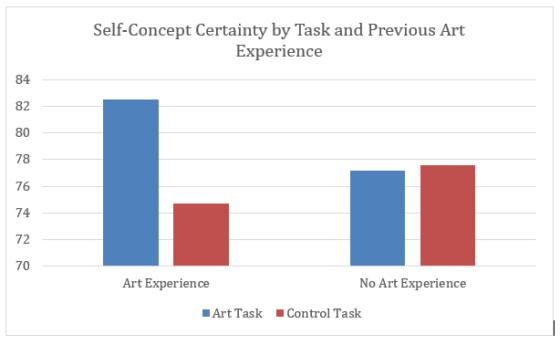Ashley Rioux, Jordyn Markle, and Dionne Liberia
(Advisor: Dr. Danielle Findley-Van Nostrand)
How well do you really know yourself? Limited research has been done on the relationship between creativity and self-concept clarity. There is some evidence that people who have reached a higher status of identity are more likely to be creative while the antithesis is true for those in lower stages of identity development (Dollinger, Dollinger, & Centeno 2005). As the identity crisis is a common problem in adolescents (Riley, 1999), some art therapy techniques are designed to aid in the development of one’s identity (Beaumont, 2015). This is useful because self-concept clarity is related to positive adjustment. The current experiment was aimed at developing a more thorough understanding of how the expression of creativity affects self-concept clarity, particularly in individuals who already identify as artistic.
58 participants from Roanoke College psychology classes were gathered through the SONA online research management system. Participants, emerging adults who earned credit in class for their participation, were then randomly assigned to either complete a 2-D art task (a self-portrait) or to write about their last 24 hours (this was the control group). Before the task, we collected information about level of artistic ability and experience in art. Before and after the task, they completed self-concept questionnaires, including indicating how certain they were (on a scale of 0-100) in each personality trait rated, and a self-report measure of self-concept clarity.
We found that overall, self-certainty (the average certainty in personality ratings) didn’t seem to differ based on doing the art task or not. But, then we ran tests separately for people who have an art background or not and found that if an individual already has an artistic background, they had higher self-concept certainty after doing a creative task than individuals who have no artistic background (see Figure 1). We expected this experiment would result in evidence indicating that creative outlets aid in one’s sense of self-concept clarity, and found that this was true only for people with an artistic background. However, other measures of creativity and experience in art were not related to certainty in self-concepts, and responses on the self-reported self-concept clarity scale were not related to participation in the task.
Since only one finding reached statistical significance, it is important to consider possible sources of error. Due to some unforeseen issues, we were forced to adapt our study into an online-only study. This may have been an issue because one group of participants was prompted to complete a drawing task. Without being able to supervise the participants, there was no way to control the conditions under which each participant completed the task. Another issue we faced was participants submitting incomplete surveys. This too may be due to the shift to online-only studies. One way we may have been able to get better results would be to have a larger sample size with more participants in each group, completing the study in person.
The purpose of this study was to determine if creative outlets are an effective way to aid in the development of self-concept clarity in college students. We wanted to expand upon the existing research by comparing 2-D art to a non-creative task, as well as further defining the effect creativity has on self-concept clarity in emerging adults. The evidence suggests a relationship between artistic expression and identity exploration, but only in those who already have an artistic background. So, creative outlets may be less helpful to self-concept clarity for people with little or no prior background in art. This study has helped us understand the relationship between artistic expression and the self-clarity concept in emerging adults.

Figure 1: Average Self-Concept Certainty by Art Task/Control group and by Previous Art Experience.
References
Beaumont, Sherry. (2015). Art Therapy Approaches for Identity Problems during Adolescence. Canadian Art Therapy Association Journal. 25. 7-14.
Dollinger, Stephen & Dollinger, Stephanie & Centeno, Leslie. (2005). Identity and Creativity. Identity. 5. 315-339. 10.1207/s1532706xid0504_2.
Riley, S. (1999). Contemporary art therapy with adolescents. London: Jessica Kingsley